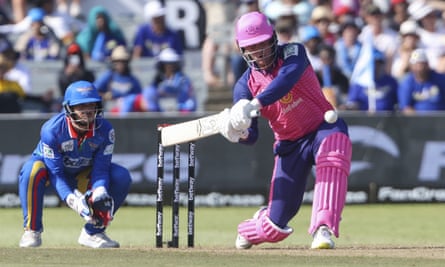South Africa’s 27-run victory against England At the Mangaung Oval on Friday kept alive their hopes of qualifying automatically for the World Cup that England will defend in India in October. They still need to win the series, however, either in the second game at the same venue on Sunday or in the final match of the series 100 miles away in Kimberley on Wednesday.
The Proteas will then need to beat the Netherlands in their final two World Cup Super League fixtures in April to make it into the main draw without having to travel to Harare for the 10-team Qualifying Tournament in June that will decide the final two places.
But the team’s struggles in ODI cricket are barely of consequence compared to the direction the entire professional game was heading in a couple of years ago. A largely ethically bankrupt administration led the governing body, Cricket SA, towards inevitable financial bankruptcy.
The new SA20 league, which has been paused for a week while this series takes place, is the remedy to all CSA’s problems, it is hoped. All six teams in the tournament were sold to IPL franchises generating millions of dollars and the domestic game is being restructured around their needs.
Even the international fixture list has been re-arranged to keep them happy; an ODI series against Australia was forfeited earlier this month to ensure the best players were available for the SA20 which contributed to the current World Cup predicament.
An upside for England was the return to form on Friday of opener Jason Roy after a year in the doldrums, his exhilarating 79-ball century being partly attributed to his involvement in the SA20 where he has been opening the batting with his national captain, Jos Buttler. “The franchise at Paarl Royals has done a huge amount for me, they’ve put their arm around me and made me feel really welcome and I’ve been really enjoying my cricket again,” Roy said on Friday.

Buttler said before the ODI series he had been naive before his stint with the Paarl Royals. He was referring to the game’s financial situation in South Africa.
In the absence of honesty and meaningful leadership from CSA the SA Cricketers Association took a road-trip around the country during which they laid out the bare truth to their professional players: they could all be out of a job within a year or two. “We told them the cold, hard truth and they appreciated hearing it,” said Andrew Breetzke, SACA’s chief executive. “It is still going to take time for the financial situation to stabilise, but at least there is light at the end of the tunnel now.”
“I’ve really enjoyed it, it’s been a fantastic tournament. I was probably a bit naive coming here as to how important it was to South Africa and South African cricket,” Buttler said. “Sharing a dressing room with those guys I’ve heard them them explaining how much they needed a tournament like that and how good it is to see the cricket stadiums full again and people watching.
“I didn’t quite know how big a deal it was but it’s been a great tournament. I’ve enjoyed the games and we’ve been really well supported at Paarl, it’s a nice set-up there,” Buttler said.
As much as it will take time for the SA20 cash to filter into the domestic game, it will also take time for the national team to rebuild and become consistently competitive again. For the past 30 years South Africans have obsessed about winning a World Cup, now they are hoping to be at one.
Friday’s victory owed far more to England messing up their run-chase of 299 after an opening stand of 146 than it did to the home team’s prowess. Attitudes and approaches to the game change slowly in South Africa and conservative batting on a flat pitch saw them finish at least 20-runs short of a par score. Buttler said England were pleased to have restricted the home side to 298 for seven.
The SA20 league commissioner, former national captain Graeme Smith, says the new tournament will “change the game forever” in the country with the likes of Buttler and Roy being joined by other international stars from whom local players can learn and advance their own games. Current national white-ball captain, Temba Bavuma, said there was nothing wrong with “borrowing ideas” from an England team that he described as “pioneers of the new era”.
Without Jonny Bairstow at the top of the order and Joe Root and Ben Stokes in the middle, and with Jofra Archer conceding 81 runs from 10 overs, England were far from their best, but they are still fancied to win the next two games and plunge Bavuma’s team back into the confusion that has characterised their game, and the national game, for the past three years.

 1 year ago
161
1 year ago
161










 English (US)
English (US)